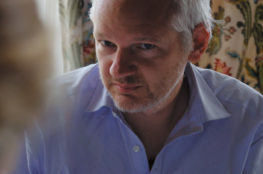Writing as a Catholic and lawyer who once tried his hand at academia, I must say that Brian M. McCall is something of a marvel. Prior to becoming a full professor and academic dean at the University of Oklahoma College of Law, McCall was a highly successful international commercial and antitrust attorney with an enviable educational pedigree. He is also a traditional Catholic who has written for The Remnant, The Angelus, and Latin Mass Magazine and published a series of books discussing the authentic social teaching of the Catholic Church. To Build the City of God (Angelico Press 2014) is both a critique of liberal modernity in the light of the Church’s perennial teaching and a practical guidebook for Christians looking to negotiate the secular age. More than a romantic call to the past, McCall intelligently and insightfully breaks apart the liberal-secularist narrative of contemporary life while calling fellow Catholic to the carpet for trying to fuse liberalism with the Faith.
After briefly reviewing the doctrine of Christ’s social kingship, McCall’s book starts logically with the family, which is the foundation of both political and economic society. Although some may find McCall’s critical thoughts on women wearing pants and the loss of cursive among children to be a tad bit “fuddy-duddy,” these remarks are bound up with a much more significant points, namely the loss of proper order in the household and the surrender of the family’s proper authority to the spirit of the times. For those familiar with the writings of John Senior, none of this will come across as particularly shocking or new, though that’s not what McCall is up to here. What McCall wants to do is paint a clear picture of just how distorted contemporary family life has become due to the barrage of false ideas and images that we are inundated with on a daily basis. Even those who have foresworn television and limit their Internet access to edifying material alone (such as the Opus Publicum web-log) cannot escape the routine broadcasting of dominant cultural assumptions concerning sexuality, equality between the sexes, and the independence of children; to build up a bulwark against such errors is no easy task, but it must be done.
Where To Build the City of God really shines is in McCall’s discussion of economic life. Over the course of several sections, McCall submits the economic ideology of libertarianism to a withering critique by reminding readers of one inescapable fact: all economic activity involves human choice. Contrary to the propaganda spread by the Acton Institute and full-throated libertarians like Thomas Woods, the “science” of economics is not about “hard laws”; nothing is determined in advance absolutely, not even the so-called “law of supply and demand.” When supply shrinks, a choice is made to raise prices; it is not inevitable. And as for the classic argument that keeping prices low while supplies are short leads to a waste of scarce resources (an argument Woods is fond to repeat), McCall highlights that raising prices only favors the wealthy; it doesn’t mean that those who truly value the scarce resources the most will acquire them. Additionally, a wealthy person may be more inclined to waste resources because he can. For instance, a man living alone making a million dollars a year could afford to buy 10 EpiPens even though he only needs one, simply because he wants to keep one in his numerous cars and rooms. Meanwhile, a family of six with a father making $50,000/year will struggle to purchase just one even though they have a child whose life could depend on the device. Does the family of six value the EpiPen any less than the millionaire or do they simply lack the means available to the millionaire?
As the book progresses, McCall offers up some practical advice for his fellow faithful. While he has some rightly harsh words for usurers, McCall’s treatment of the topic is both charitable and nuanced. As he makes clear, not all loans — even loans with interest — are necessarily usurious, though many are. McCall also clears the air about bankruptcy brought on by such lending and other social conditions; although we have an obligation to pay our debts, there are legitimate circumstances where bankruptcy is necessary and the shame associated with the option is bound up with Protestant economic ideology rather than authentic Catholic teaching. Equally powerful is McCall’s discussion of tithing, a practice promoted by Protestants and even many Eastern Orthodox, but which has no authentic basis in the Gospel. It’s not that McCall is calling on Catholics to not support the Church; that duty can be found even in the natural law. Rather, McCall rejects the pernicious idea that the Church demands a flat 10% “tax” from the faithful while also discussing how the modern state and the current liberal economic ordo fleeces people of their rightful wages before they even have a chance to give to the Church.
My choice to finally pick up To Build the City of God is fortuitous given the recent break-out of an old error, namely the “Catholic socialism” of the self-proclaimed “Tradinista Collective” (see here and here). Although McCall spends the bulk of his work attacking the errors of political, social, and economic liberalism, implicit in his argument is a powerful rejection of the socialist temptation to seek-out a top-down “solution” to our present woes. Unlike the Tradinistas, McCall recognizes the proper role of hierarchy and subsidiarity in a just society. Above all, by demonstrating consistent fidelity to the Church’s social magisterium and her centuries-long tradition of confronting socio-economic realities in the light of both natural and divine law, McCall offers up a truly Catholic alternative to the liberal order. If only others were brave enough to follow in his suit.



October 2, 2016
Been meaning to get my hands on this for ages, mainly because John Senior wrote so little and I need more encouragement! Heading on over to Book Depository right now… Thanks!
October 2, 2016
Some time ago, you wrote a brief and rather dismissive post on John Senior, based, as I recall, on a fragmentary perusal of his work. I have hoped since then that you would read his work more thoroughly and write a more informed critique. Have you done so? If so, I’d be very interested in your thoughts on the man and his work.
October 2, 2016
The post in question was on an earlier iteration of this web-log. I have read his two books on Christian culture. I am not aware of any other writings of his. Overall, I am fine with Senior; I just find some of his remarks to be a bit…much.
October 3, 2016
Brian McCall is great. I’m not sure why you’re so intent on attacking the Tradinistas though. Yes, there are some questionable parts of their platform, but it seems to me that they can play a helpful role in introducing many young Catholics to traditional Catholic social thought who would otherwise be attracted to much worse sorts of “leftism.” What other “leftists” take “integralist” teaching on the Social Kingship of Christ so seriously? I think we need both the Brian McCall’s and the Tradinistas.
October 3, 2016
I believe you mean “Tradinista!s”.
October 3, 2016
Pater Edmund,
I cannot in good conscience align with, endorse, or even ignore something which is predicated on error to the degree the Tradinistas are. Moreover, in attempting to defend themselves from criticism, they have engaged in such typical tactics as sleight of hand, proof-texting, and outright lying. Their general plea now seems to be that anyone who disagrees with them is “myopic” and “selective,” when in fact they have conveniently side-stepped a great deal of the Church’s magisterium and social tradition in order to manufacture a platform for defending socialism. The problem is, this socialism they defend is not only bloodless, it is incoherent. At the end of the day I am increasingly convinced that this whole thing is a posture and nothing more. If it proves to be more than that I will retract that judgment.
October 5, 2016
Well, I guess time will tell.
October 5, 2016
Seems to me that people who read and agree with Steven Long’s Natura Pura and Charles De Koninck’s On the Primacy of the Common good can’t be far off the mark.